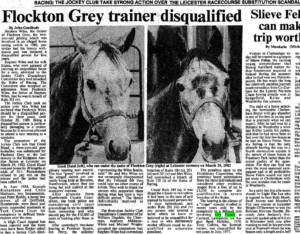Horse racing is a sport that has been in our sports culture for donkey’s years (pun intended), nevertheless, it is something that is often used as a topic, for quiz nights, gatherings etc. So, we thought it would be good if we gave you the facts that you need to know, in terms of all the most obvious ones, so you can take over your next trivia night by storm! Make sure to check out the list that we have compiled for you, so you can really get in there, with the knowledge you need, to look like a horse racing professional and know how to bet like one too!
The first ever winner at Kentucky Derby
The first ever winner to take the Kentucky Derby race by storm, was the Aristides horse. Winning in 1875, he beat 14 other horses at a 1.5-mile race, for just $1000 prize money! Of course, something to add is, money back in the 1800’s was valued far greater than today’s comparisons. $1000 dollars back in the day, was equivalent to near enough a million dollars today we might add. There is something extra that you may have not known!
Saratoga holds a Racing Hall of Fame
In Saratoga Springs, New York there is an annual racing Hall of Fame that takes place, where many horses will be acknowledged, in addition to the jockeys, trainers and other historical figures that take part within the world of horse racing. You should definitely pay attention to this event, as it is another great way of learning all about the trainers that are present within the industry now and previously!
Oldest trainer to win the Kentucky Derby
The oldest trainer to ever win the Kentucky Derby, is a gentleman named Art Sherman. This guy was able to take the California Chrome in 2014, at 77 years old. Now how about that!
13 horses in total have won the Triple Crown
Justify is of the last Triple Crown Winner, taking it in the year 2018. The one before that was the very well-known American Pharaoh. In 2015, the American Pharaoh ended a 35-year pause/break from Triple Crown winners, as no horse managed to claim all three prestigious races (Kentucky Derby, Preakness Stakes and Belmont Stakes) for the win until 2015! This fact should definitely prove fruitful to all trivia wannabes.
The weight of a Thoroughbred
The weight of a typical Thoroughbred usually makes or exceeds by just a little over 1000 pounds. There are horses that weigh more of course, being that this horse is a medium build. But this mass is considered the optimum for running distances with great endurance, speed and stamina. Usually when the horse weighs more than this, this tends to slow the horse’s performance by quite a bit, which is not what jockeys need, to zoom past their competitors now, is it?
The Breeders Cup is Equivalent to the Super bowl
Yes, you heard that right. The Breeders Cup is so popular in the horse racing world, that it pretty much equates to the Super bowl in sports value. The Breeders Cup offers one lucky champion, the opportunity to reel in a total of $28 million in winnings.
Triple Crown races have a minimum age to compete
You heard that one right. Horses that want to enter the Triple Crown will need to be three years old, or higher. Essentially these races are the most superior of all races around the world and horses usually have just one shot to claim that gold crown!
